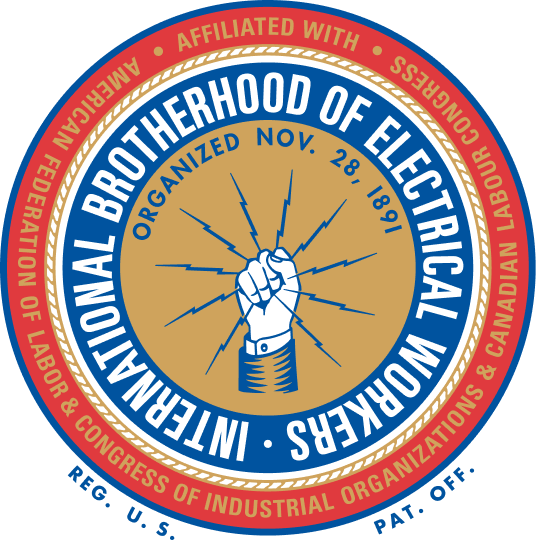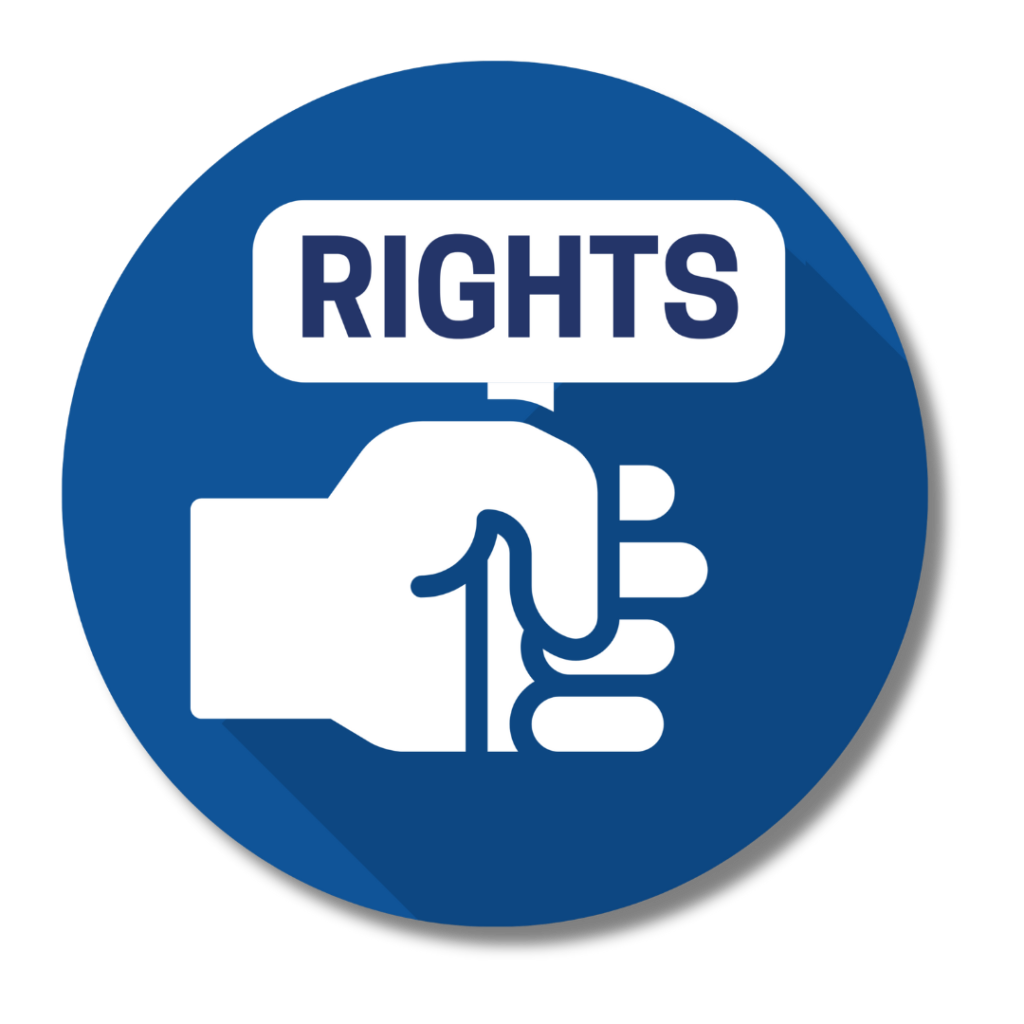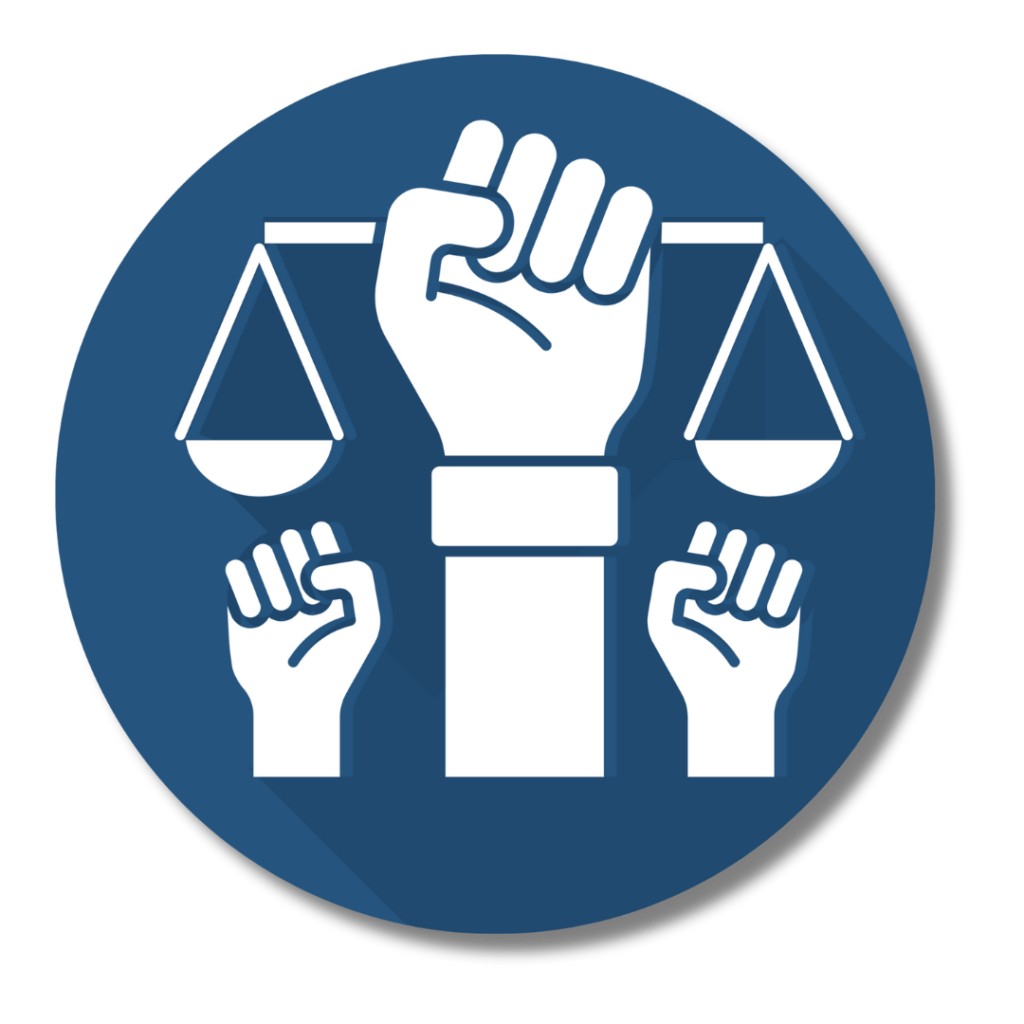cooperatives.
utilities & generation
International Brotherhood of Electrical Workers
IBEW UTILITIES SECTOR
The IBEW’s Utility Members are employed by a wide range of companies including: Investor-Owned Utilities, Cooperatives, Municipalities, and Government. The department provides assistance to over 250 Local Unions in Canada and the United States, supporting some 200,000+ utility workers.
The IBEW Represents Employees at:
- 83% of all the organized utilities in the United States and Canada
- 90% of the organized investor-owned utilities
- 96% of the organized rural electric cooperative utilities
- 76% of the organized municipal utilities
- 100% of all organized federal government utilities
- The IBEW represents workers at 66 out of 94 operating nuclear power reactors in the U.S. and 1 Canada reactor in New Brunswick Canada.
In the utility industry, the IBEW represents linemen, groundmen, equipment operators, boiler operators, I & C techs, maintenance mechanics, electricians, welders, control room operators, and dispatchers. Then, there are the meter installers, meter readers, field reps, clerical workers, cable splicers, substation electricians, natural gas technicians, water sewer distribution technicians, utility telecommunications, warehousemen, communications techs, fleet servicemen, and relay technicians.
local unions worldwide
years of advocating
for workers
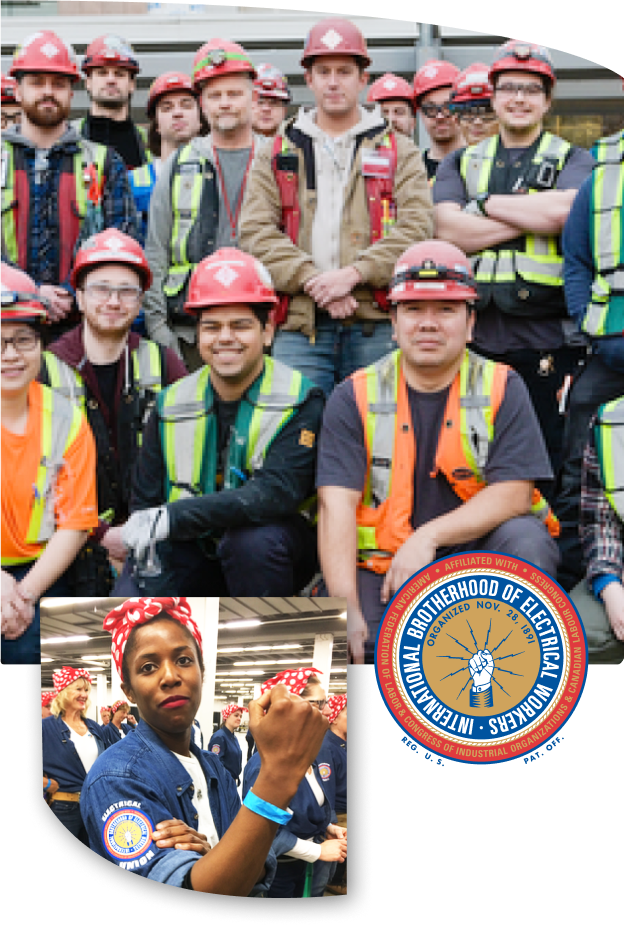
frequently asked questions
- At-Will Employment vs. Working under a Collective Bargaining Agreement (CBA) Absent a contract stating otherwise, employees are presumed to be at-will employees. That is, they’re employed at the will of their employer. Their employer unilaterally sets all the terms and conditions of employment, can change them any time it wants and for any reason it wants. An employee’s only choice is “take-it or leave-it.”
- By contrast, workers who form unions and negotiate a contract with their employer are employed under the terms and conditions of that contract. The employer cannot change the terms and conditions of the contract without the union agreeing to those changes, and is legally bound to honor that contract. The contract between a union and an employer is commonly referred to as the Collective Bargaining Agreement or CBA.
- The union can’t control how your employer behaves so we can’t promise that it won’t violate the law. However, any threats, coercion, or retaliation by the company will result in the union filing Unfair Labor Practice Charges with the National Labor Relations Board.
- You can learn more about your rights under the National Labor Relations Act by visiting the NLRB’s website: nlrb.gov.
- Here are 35 things that employers sometimes do that violates the law. “35 Things The Company Can Not DO Flyer.”
- Most employers who learn that their employees are forming a union will bring in their own specialists. They may call themselves union avoidance consultants, or labor relations consultants, but their job is to convince you to remain at-will employees. These well-paid consultants orchestrate and carry out the employer’s campaign against the union.
- The management will likely hold captive audience meetings to talk to employees about unions and how bad it would be if one were to come into this workplace. High-level managers and corporate executives often speak at these meetings too. The meetings are held during the workday, so attendance is mandatory. They often include lunch or a pizza party.
- The goal of the union buster is to create fear and doubt among the employees.
- They’ll ignore the fact that you and your coworkers are forming this union and portray the union as “a third-party of outsiders” coming in to disrupt the great relationship that currently exists.
- They’ll portray the union as a business, saying you’re just customers that the union needs to stay in business. They’ll ask, “Why would want to pay money to a union?
- They’ll admit they may have made some mistakes and weren’t aware that employees weren’t happy. This is followed up with the promise to make things better if you give them one more chance.
- They’ll try to discourage you by saying that organizing will be an act of futility, or that you may end up with less than you have now. (For one, this is an unlawful threat, and two, it’s not true. No contract goes into effect unless it’s voted on and accepted by the workers, and why would you vote to accept a contract that wasn’t beneficial to you?) Click Here for more info on how. “Bargaining does not start from a blank sheet of paper.”
- For more things employers say to dissuade employees from forming unions, click on “12 Dirty Tricks You Should Know About.”4. Because employers need a majority of the employees to vote against the union, you can expect to be treated with the respect you’ve long deserved. This is by design, as it’s a proven tactic to make employees feel things are better now and maybe we don’t need a union after all. (Hint: It goes away as soon as the threat of forming a union goes away, and things go back to the way they had always been.)
- You should be prepared for lies and false statements made by your employer. The NLRB will not investigate false statements and lies made during an organizing campaign because it feels it’s the workers’ responsibility to distinguish fact from fiction. As such, it is imperative that you do your research and determine for yourself who is telling you the truth and who is lying to you.
- First, it’s important to again recognize that you and your co-workers are forming this union. Using your union to harm the employer would obviously not be in your best interest and is therefore not something you would do.
- Second, the IBEW is by no means anti-employer. It fully recognizes that employers and employees are co-dependent on each other, and when companies prosper it provides opportunities for workers to prosper too.
- When employees form unions and engage in collective bargaining, they’re doing so to protect their interests and help assure they’re not trampled on as their employers seek to increase profits.
- Some employers respect their employees’ right to choose to form a union and negotiate collectively or remain at-will employees.
- Some employers prefer this relationship, as it stabilizes the workforce, helps it retain experienced and valuable workers, and helps them to project their labor costs in the coming years.
- That being said, employers prefer the “At-Will” employment relationship because it allows them to call all the shots unilaterally. It allows them to make changes anytime it wants or for whatever reason. Having their employees take advantage of the National Labor Relations Act creates an unwanted counter to management’s ultimate power, so you can at least expect the Company to try and persuade you that you are better off being union-free and campaign against the union.
- The NLRB requires that employees demonstrate a minimum showing of interest before it will come in and conduct an election. It requires proof that at least 30% of the workforce is interested in collective bargaining.
- As such, the union must first determine what it feels is an appropriate bargaining unit.
- The IBEW then asks employees in this bargaining unit to sign an “Authorization Card.” These cards are used for two purposes. (1.) They show IBEW who supports forming a union. (2) They show the NLRB there’s a sufficient number of interested employees for them to hold an election.
- Can I be fired for signing a card? It is clearly unlawful for an employer to retaliate against anyone for signing a card. Additionally, these cards are treated as strictly confidential by the IBEW and the NLRB. (Unless you tell someone you signed one, no one will ever know.) Cards can be submitted electronically from this website, further assuring confidentiality.
- Can I sign a card and still vote NO? Yes, the cards only get you to an election. It’s the votes cast during that election that determines if the majority supports the union and collective bargaining.
- If enough employees sign authorization cards, IBEW will file a petition with the NLRB that asks them to come in and hold a secret ballot election.
- On this petition, the union lists the employer and location, and a description of the bargaining unit. Not the names of the employees, but a list of classifications to be included, as well as those to be excluded. (Managers, supervisors, and security guards are automatically excluded by law.)
- The employer receives a copy of the petition, but not the authorization cards. They go directly to the NLRB who also won’t reveal who signed them, or even how many employees signed them.
- The NLRB will try to get the union and the employer to mutually agree to the election details and bargaining unit. This happens 90% of the time, and when it does the parties sign a stipulated election agreement outlining the bargaining unit, and when and where the election will be held.
- Sometimes an employer will challenge the make-up of the bargaining unit. (It has the right to make a challenge, but it can’t dictate what it will be.) If the Company were to challenge the make-up of the petitioned-for unit, the NLRB listens to the arguments from both sides and makes the final determination of who is included and who is excluded, and when and where the election will be held.
- The amount of time between the union filing the petition and the actual election is typically four to six weeks. The process may be delayed if the employer challenges the petitioned-for bargaining unit, and some employers use challenges as a delay tactic.
It’s important to understand that workers don’t hire a union, or bring in a union, they join together with their co-workers to form the union. The reason they do this is because it’s the only means workers have to compel their employer to bargain with them in good faith for a written contract. The IBEW has experienced representatives and negotiators to lead the way, but the issues proposed by the union during negotiations are those the workers themselves bring forward. You’re forming a union to accomplish as a group what you can’t as individuals.
- Union dues are voted on by the union’s members and appear in the IBEW’s Constitution and the local union’s By-Laws. Dues to the International Union are voted on by delegates IBEW local unions send to its International Convention held every 5-years. Dues for IBEW local unions are voted on and established by the members of that local and are listed in its By-Laws.
- Further, workers in IBEW organizing campaigns don’t pay any dues whatsoever until the election is won, a first contract has been negotiated, and that contract has been voted on and accepted by a majority of the employees in the bargaining unit.
- The IBEW also waives initiation fees for new members joining the union as a result of an organizing campaign.
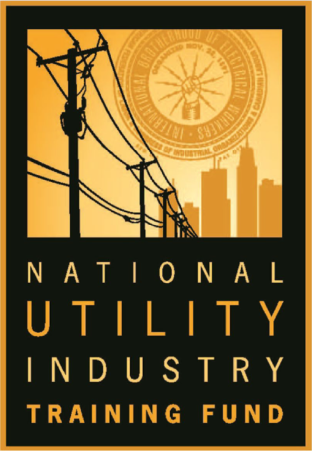
The National Utility Industry Training Fund is a partnership between the IBEW and several utility companies whose mission is to provide employees and prospective employees with the best training available in the industry today.
watch our members on the job

3:50

3:31

3:36

3:23

4:10
learn more about our careers
TRANSMISSION & LINEWORK
cooperatives, utilities & generation
CLEAN ENERGY
RAILROAD
GOVERNMENT & MUNICIPALITIES
TELECOM & BROADCASTING
MANUFACTURING
CONSTRUCTION
the facts about unions
Knowledge is Key
Whether you are an experienced veteran or brand new to unions, educating yourself on your rights is key. There are many myths that exist about how a union functions and rights of its members. The interactive chart shares accurate information that will help you in your decision making process.
